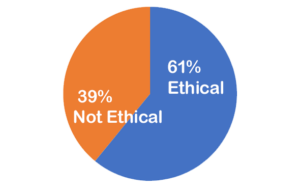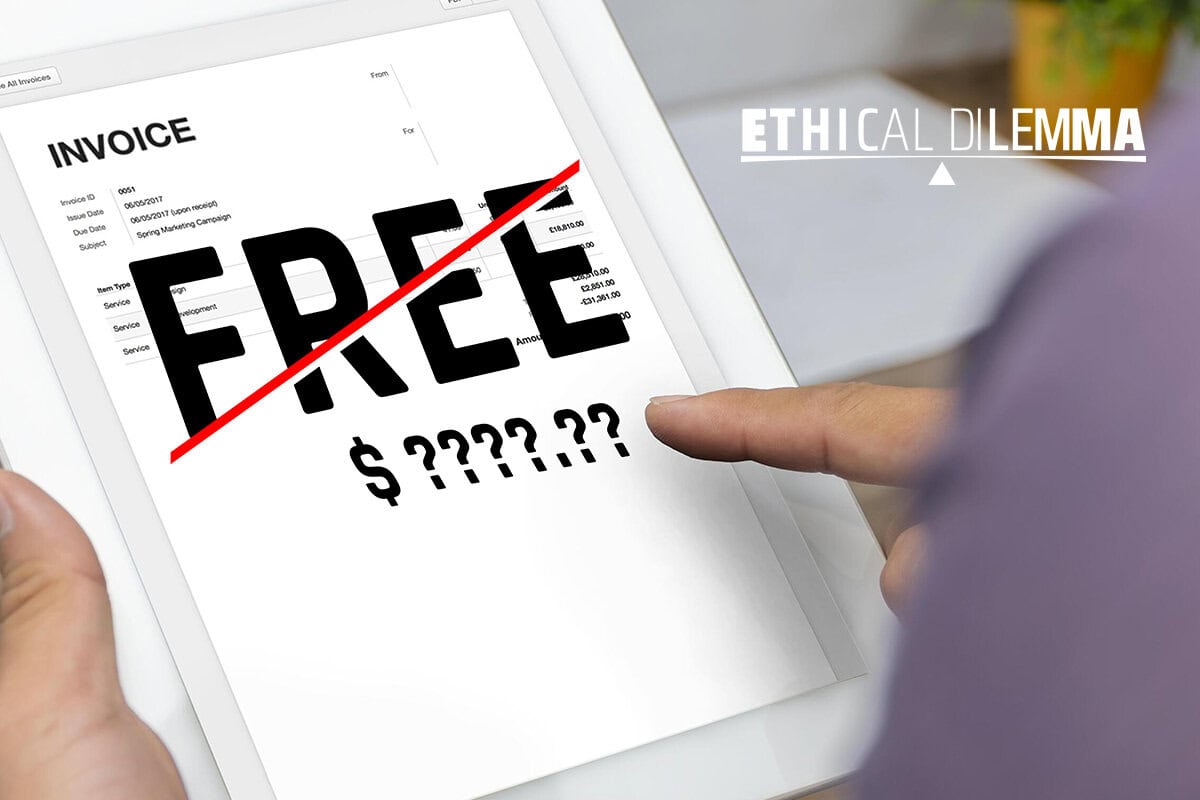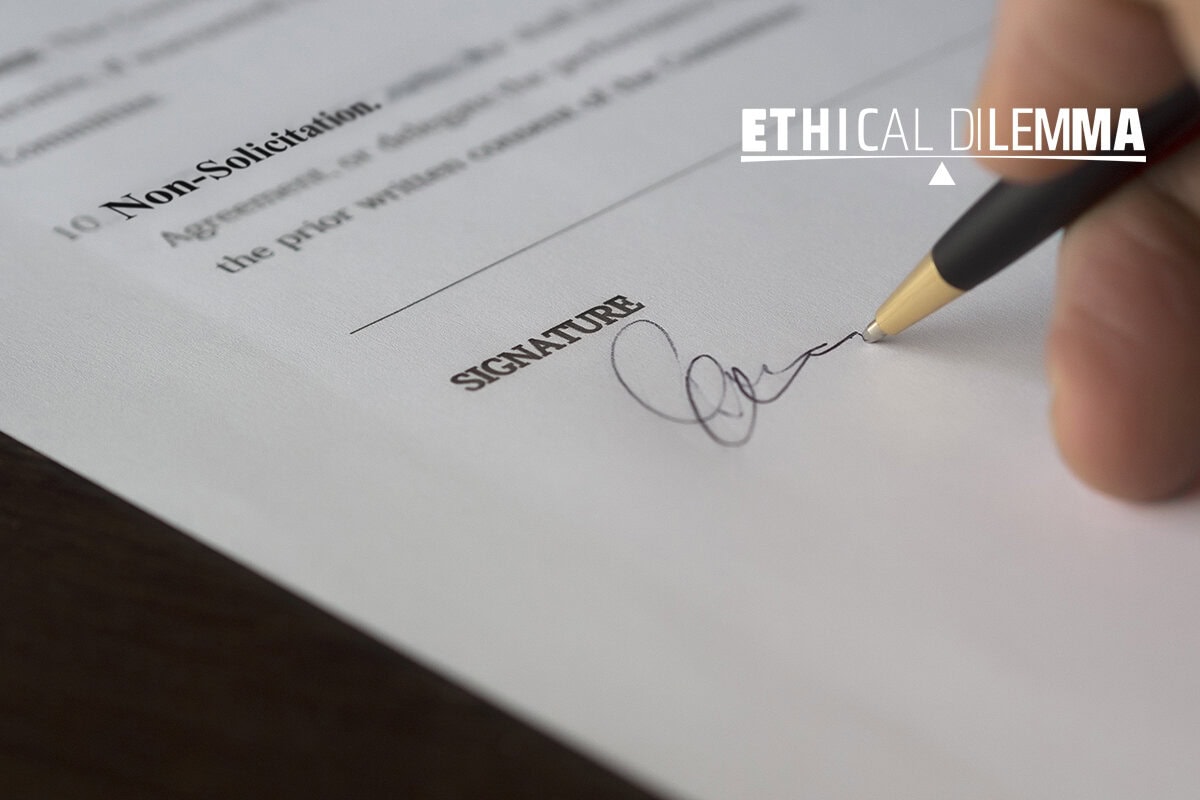This is the December 2024 edition of our monthly series of Ethics case studies titled What Do You Think? This series is comprised of case studies from NSPE archives, involving both real and hypothetical matters submitted by engineers, public officials, and members of the public.
Your peers and the NSPE Board of Ethical Review have reviewed the facts of the case as shown below. And, here are the results.
Your opinion has been registered for the December 2024 edition of our monthly series of Ethics case studies titled What Do You Think?
Your vote is recorded as:

Want to know how your peers voted? We’ll send you an email with the poll results on
December 24.
Your opinion has been registered for the December 2024 edition of our monthly series of Ethics case studies titled What Do You Think?
Your vote is recorded as:

Want to know how your peers voted? We’ll send you an email with the poll results on
December 24.
A Review of the Facts
Engineer Wendy is employed by a computer manufacturing company. She was responsible for the design of certain computer equipment several years ago. She signed off on the drawings for the equipment at that time. Although Wendy’s design was properly prepared, the equipment manufacturing process was faulty and, as a result, the equipment became too costly and suffered mechanical breakdown. The manufacturing division made a number of recommended modifications to her design that it believed would help reduce costs in the manufacturing process. Wendy’s analysis of the manufacturing division’s recommendations revealed that they would reduce the reliability of the product and greatly increase the downstream costs to the company through warranty claims.
Wendy’s supervisor, who is not an engineer, asks Wendy to sign off on the changes for the new computer equipment. There is nothing to suggest that the equipment would pose a danger to public health and safety. Wendy raises her concerns to her supervisor but nevertheless agrees to sign off on the changes without further protest.
What Do You Think?
Did Wendy fulfill her ethical obligation by signing off on the changes without further action?
Here is the result of our survey of your peers:

Applicable NSPE Code References:
II.1
“Engineers shall hold paramount the safety, health, and welfare of the public.”II.1.b
“If engineers’ judgment is overruled under circumstances that endanger life or property, they shall notify their employer or client and such other authority as may be appropriate.”II.1.b
“Engineers shall approve only those engineering documents that are in conformity with applicable standards.”II.2.b
“Engineers shall not affix their signatures to any plans or documents dealing with subject matter in which they lack competence, nor to any plan or document not prepared under their direction and control.”II.4
“Engineers shall act for each employer or client as faithful agents or trustees.”III.2.b
“Engineers shall not complete, sign, or seal plans and/or specifications that are not in conformity with applicable engineering standards. If the client or employer insists on such unprofessional conduct, they shall notify the proper authorities and withdraw from further service on the project.”
Discussion
This case raises a fundamental issue concerning the professional integrity of engineers and the ethical obligations engineers owe to their employers, clients, and others. How far must engineers go in stating concerns in matters that directly involve their judgment as professional engineers but do not directly impact public health and safety?
It is clear from the Code of Ethics and previous Board of Ethical Review opinions that in matters involving public health and safety, the engineer has an ethical obligation to “stand firm” and take action to protect the interest of the public. The Code is replete with provisions that reinforce the view that engineers have a fundamental obligation to the public welfare and if their judgment is overruled under circumstances that endanger the public, the engineers should notify employers, clients, or such other authority as may be appropriate.
In the instant case, the ethical concern is less a matter of the protection of public health and safety and more a matter of engineering judgment which is being overruled by her supervisor on the basis of non-engineering criteria.
In addition, we should also note at this juncture that the NSPE Code of Ethics makes it clear that the engineer has an ethical obligation to act in professional matters for her employer as a “faithful agent and trustee.” In this regard, to what extent would this provision in the Code of Ethics impact upon any obligation that an engineer might have to “stand firm,” in a difference of opinion, with an employer on a matter that does not have a direct impact upon the public health and safety?
We believe these seemingly conflicting provisions of the Code of Ethics can be reconciled. While it is clear that the engineer should act consistently with the interests of her employer and not act disloyally by impugning the motives of her employer in any way, we also think it is vitally important for an engineer whose professional judgment is overruled to clearly explain the reasons for her position and vigorously engage those persons who disagree with her judgments in a serious debate as to the technical issues involved.
Here, Wendy was asked to approve modifications that she believed, based on her technical knowledge, would not be in the long-term interests of her employer. Since she possessed the engineering expertise, experience, and background to make these determinations and was presumably hired to provide that input to the company, it would seem that she would clearly be performing as a “faithful agent and trustee” if she were to make her concerns known to those in management who were most directly concerned with the long-term interests of the company.
We cannot see how an engineer could be said to be acting as a “faithful agent or trustee” by silently assenting to a course of action that will have serious long-term ramifications for an employer. Engineers should be vocal on technical issues in which they possess knowledge and should not merely serve as a “rubber stamp” on engineering matters. Code II.4 should not be used as a “crutch” for engineers to avoid confronting difficult professional decisions, but instead as a basis for providing their employers and clients with critical engineering judgments and determinations.
Finally, we would add that since Wendy’s immediate supervisor was not receptive to her concerns, we believe Wendy had an ethical obligation to bring this matter to the attention of those in management at a higher level than her immediate supervisor. Prior to taking this action, we believe Wendy should explain to her immediate supervisor her professional and ethical obligations under the circumstances and disclose her course of action.
The Ethical Review Board’s Conclusion

Wendy did not fulfill her ethical obligation by signing off on the changes without further action.
BOARD OF ETHICAL REVIEW
Eugene N. Bechamps, P.E. Robert J. Haefeli, P.E. Robert W. Jarvis, P.E. Lindley Manning, P.E. Paul E. Pritzker, P.E. Harrison Streeter, P.E. Herbert G. Koogle, P.E.-L.S., chairman
Note – In regard to the question of application of the Code to corporations vis-a-vis real persons, business form or type should not negate nor influence conformance of individuals to the Code. The Code deals with professional services, which services must be performed by real persons. Real persons in turn establish and implement policies within business structures. The Code is clearly written to apply to the Engineer and it is incumbent on a member of NSPE to endeavor to live up to its provisions. This applies to all pertinent sections of the Code. This opinion is based on data submitted to the Board of Ethical Review and does not necessarily represent all of the pertinent facts when applied to a specific case. This opinion is for educational purposes only and should not be construed as expressing any opinion on the ethics of specific individuals. This opinion may be reprinted without further permission, provided that this statement is included before or after the text of the case.









She raised her concerns to her supervisor. How is that “silently assenting” and signing the drawings? Maybe she could have been more vocal in her opposition but I would not go so far as to say she was acting unethically.
Policy and financial decisions are not the engineers ballpark unless it affect safety.
It seems the board’s only reason for giving this a ‘not ethical’ conclusion was that in the facts presented it wasn’t clear if Wendy shared the engineering concerns with higher management than just the supervisor. I don’t feel that it was clearly indicated in the facts presented that Wendy hadn’t shared the information with higher management, therefore it was ethical to accept the direction and desire of the company to reduce cost and quality while maintaining a safe product. I work as a building design mechanical engineer. I encourage our end users/clients that redundancy and top quality products would result in a longer lasting better products. However, since financial concerns always exist, I feel it is ethical to accept and go along with cost saving measures provided the concerns are clearly presented to management and ensuring that public health and safety isn’t compromised.
“There is nothing to suggest that the equipment would pose a danger to public health and safety. Wendy raises her concerns to her supervisor but nevertheless agrees to sign off on the changes without further protest.”
She has a duty to guard the public health and safety. Those are not in play here.
She told her supervisor that these changes will hurt the company’s bottom line. Duty fulfilled…sign away!
This is not actually a PE topic, considering the details written in the case… In addition to the other above commenters, she was working for a private sector company. She was not practicing before the public. If it is a non-safety, financial decision of a private company, it is up to an economic assessment of product cost now vs warranty cost later. If she followed company protocol to voice her concerns, then its up to her supervisor as to whether he/she followed their private company policies for involving all the correct decision makers in the choice…
I said ethical because Wendy made it known to her supervisor what her concerns were. Seems like the only downside to her approval was added future costs to the company. So shame on management for coercing her to approve. As stated in the facts the there was no public safety concern, only financial impact to the company.
I believe that this is taking the definition of ‘unethical’ a bit too far. She is assuming that the changes required by manufacturing WILL generate a negative commercial impact to the company some time out in the future. There are a myriad set of inputs in product development. This is obviously a revision of the product during its lifespan and I would expect that it will be monitored to ensure commercial viability.
Computer equipment manufactured to Wendy’s design already has become too costly and is *currently* experiencing breakdowns. Apparently, correction to or upgrade of the “faulty” manufacturing process is not available or not economically feasible or else it would be implemented.
There is no readily discernible public safety concern, only financial impacts to the company. This is an economic issue not an engineering issue.
To the extent that it is an engineering concern it is an engineering economics matter for a present worth analysis: cost of the ongoing high-cost production with associated repairs compared to the cost manufacturing division’s lower-cost production with its associated repairs.
Once again the facts do not state whether or not Wendy is licensed but I will assume she is licensed. There is no public safety issue here, and she did inform her supervisor of the consequences of this action. So this may be bad business, but not unethical behavior.
As this is a private company and there isn’t a threat to public health and safety, there is nothing inherently wrong with the company making the changes and moving forward without agreement of, and signing off or sealing the documents for change by the engineer. The engineer has the right and the responsibility to disagree with changes and not sign off or seal said changes.
Further action against management could have gotten her fired. Is that what you are recommending?
This is a complicated situation. Wendy voiced her concerns to her supervisor. In that, she fulfilled her obligation to the company. If she refused to sign, went over her supervisor’s head, or to the manufacturing department, she takes a gamble with her career, or possibly gets fired. She should carefully document her concerns and her supervisor’s actions and send a copy to someone she trusts (maybe her mentor, if she has one). Some time down the road, her supervisor will have been promoted for saving the company money. In a few years, when warranty costs are out of control, someone will see her signature on a document and call her on the carpet. Hopefully, she will have a sympathetic ear higher up in the company, or a better job somewhere else when and if that happens. I agree with the other comments concerning the board’s decision. If we had a more complete picture of the situation, maybe we could agree with the board. Or, maybe the board should revisit the issue. Company politics and ethics probably mix as well as oil and water.
Great discussion. I believe Wendy was ethical in her decision. No public safety issues, only commercial negatives for the company who twisted her arm to sign-off on the new “improved” design.
I was put into this situation at a former employer, by being asked to sign-off on testing of engines that I did Not test nor was able to run on the company’s dynamometers. I refused to sign the test reports. I did fill out the test report records and ran the needed calculations for the engines to certify their compliance within the scope of operations, but I would not and did not sign-off on the actual testing of the engines. I was told to sign the tests and again refused. I took the test paperwork to the director of engineering and explained why I would not sign-off on the test results because I had not done the testing. I than told him, that if they needed to be signed off, he would have to be the one signing them off. He decided that he would not sign-off either and returned to problem to the sales personnel to deal with their customer. I was told later that Sales wanted me to be fired, but my manager would not agree to that happening. I left shortly thereafter of my own accord and with another job to go to.
This was not a safety issue. It was an economic decision. She provided her input. If management decided to take the financial risk, then so be it. That is Management’s job. We are engineers, not lawyers. Write the code in “plain language”.
This bothers me. To say Wendy acted unethically means she could be brought up on charges before the PE board or NSPE. What she did does not warrant that in any way. Me? I would probably have run this right up the food chain. I did that several times in my career and was respected for it in the long run, but there were also times when I didn’t. It depended on the gravity of the problem and who was up the food chain. Those are value judgements that only Wendy can make, and to brand her actions as unethical goes way too far.
I agree with the many responders who indicate that this is not a Safety Issue and nowhere does it indicate that anyone’s safety was put in danger, thus the “Engineering Ethics” aspects of these topics / scenarios is not in play. To me this is internal company politics. My question is there is a statement in the scenario that “Wendy’s Design was properly prepared” exactly what does this mean? Was it per the equipment recommendations? Was it per company policy? In fact by signing off on the changes which her supervisor didn’t want to do gives him someone to throw under the proverbial bus if something goes wrong!